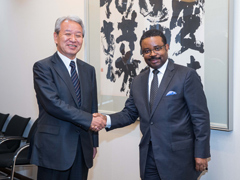On August 17, the Japan International Cooperation Agency (JICA) signed the first loan agreement with the Government of the Republic of Angola to provide a Japanese ODA loan of up to 23.64 billion yen for the Power Sector Reform Support Program. Named the Development Policy Loan, this loan will support policy improvements in the Republic of Angola, which is a developing country.
Since the 27-year civil war ended in Angola in 2002, progress has been made in socioeconomic reconstruction and development. Including petroleum, Angola is blessed with an abundance of natural resources, and a high rate of growth has been achieved in its gross domestic product, averaging at least 10 percent each year since 2002. As of 2015, Angola has the third largest economy in Africa, following Nigeria and South Africa, and there is a great deal of focus on the country as one of the leading markets in Sub-Saharan Africa. The Government of Angola has established a policy of industry diversification and is implementing institutional reform toward expanding foreign investment in the country.

Akihiko Tanaka (left), JICA president, shakes hands with Armando Manuel, Minister of Finance, after the signing.
However, the energy supply has not been able to keep pace with the rapidly increasing demand, the country has an electrification rate of only about 30 percent, and power outages, which occur frequently, particularly in urban areas, are heavily impacting business activities. The country also faces structural challenges, including an unsuitable fee system, an inadequate fee collection capacity, a large power transmission and distribution loss and complicated procedures for power distribution. In addition, regulations provide foreign investors with receive tax exemptions and other favorable treatment, and complex government procedures, restrictions on foreign currency remittance and other issues affect the investment environment in Angola.
To solve these problems, the Government of Angola has made the power sector one of its priorities in its national development plan and formulated the National Energy Power Security Strategy Policy. Under the framework of these policies, the Government of Angola is 1) implementing energy sector structural reforms, 2) introducing public-private partnerships, and 3) promoting projects pertaining to power source development (natural gas, combined cycle power generation, hydroelectric power generation), and the distribution and transmission of power. To achieve these reforms, the government also formulated the Electricity Sector Transformation Program, which lays out objectives to be achieved incrementally in four stages, along with actions to be taken from 2010 to 2025, and sets targets to be achieved by 2025: a power access rate of 60 percent from the current 30 percent and a power generation capacity of 8,742 megawatts from the current 2,120 megawatts.
Through co-financing with the African Development Bank (AfDB), this project will provide a Development Policy Loan with the aims of: 1) restructuring the power sector and improving the regulatory environment, 2) fostering private sector investment in the power sector, 3) enhancing transparency and efficiency in public finance, 4) enhancing gender mainstreaming and environment and social safeguards, and 5) improving the business environment for foreign direct investment. Of these, the fifth aim for the investment environment is a policy improvement objective that JICA assists with independently, as the private sector strongly needs a better business environment in such areas as: 1) revisions to the investment laws, 2) improvements to the procedures for acquiring visas and remitting money overseas, and 3) stable operation and improved transparency in the regulations pertaining to private business.
The co-financing for this program with the AfDB will be carried out under the Enhanced Private Sector Assistance for Africa (EPSA for Africa).*
It is expected that implementation of this project will improve power access and the investment environment, contribute to sustainable economic development in Angola and encourage foreign investment to Angola.
* During the Gleneagles G8 Summit in 2005, the Government of Japan launched EPSA with AfDB and announced Japanese ODA in the amount of 1 billion dollars. At the Camp David G8 Summit in 2012, stimulating private investment in Africa was discussed as an on-going pressing challenge, and Japan decided to provide an additional 1 billion dollars equivalent in ODA loans over five years.
EPSA is a program implemented through financing and technical support, and JICA carries out the financing portion. There are two financing methods used: 1) Accelerated Cofinancing Facility for Africa (ACFA) with the AfDB funds for governments, government agencies and others (this project), and 2) private sector assistance financing under the EPSA.
Reference
| Project title | Amount (million yen) |
Annual interest rate (%) | Repayment period (years) |
Grace period (years) |
Procurement | |
|---|---|---|---|---|---|---|
| Project | Consulting services | |||||
| Power Sector Reform Support Program | 23,640 | 0.01 | - | 40 | 10 | General untied |
Note: Concessional terms apply.
2. Executing Agency
Ministry of Finance, Republic of Angola
Phone: +244-222-338548
3. Planned Implementation Schedule
(1) Completion of project: October 2015 – with completion of the loan disbursement
(2) Consulting services: No hiring of consultants is planned for this project.
(3) Tender announcement of initial procurement package for international competitive bidding on project construction: No procurement for construction is scheduled for this project.




scroll